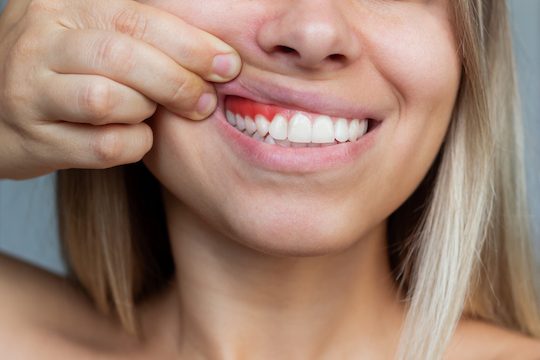Gum Disease Management
Treatments for Gum Disease

Gum Disease Management Cheltenham
Periodontitis, or gum disease, is a common oral infection that damages the soft tissue and bone supporting the tooth.
Without treatment, the bone around the teeth is slowly and progressively lost.
Symptoms of Gum Disease
Healthy gums are firm and pale pink and fit snugly around teeth.
Symptoms of periodontitis can include:
- Swollen or puffy gums
- Bright red, dusky red or purplish gums
- Gums that feel tender when touched
- Gums that bleed easily
- Pink-tinged toothbrush after brushing
- Spitting out blood when brushing or flossing
- Bad taste or smell in the mouth
- Pus between teeth and gums
- Loose teeth or loss of teeth
- Painful chewing
- New spaces develop between your teeth
- Gums that pull away from your teeth
- Changes in the way your teeth align when you bite

Causes
Plaque is the main cause of gum disease. However, other factors can contribute to gum disease.
Hormonal Changes
Hormonal changes, such as during pregnancy, puberty, menopause, and menstruation, make gums more sensitive, making gingivitis easier to develop.
Illnesses
Illnesses may affect your gum condition. This includes diseases like cancer or HIV that affect the immune system. Since diabetes affects the body’s ability to use blood sugar, patients with this disease have a higher risk of developing infections, such as gum disease and cavities.
Medications
Some medications can lessen the flow of saliva, which has a protective effect on teeth and gums. Some drugs, such as anticonvulsant medications and anti-angina drugs, can cause abnormal growth of gum tissue.
Bad Habits
Bad habits such as smoking and using other tobacco products make it harder for gum tissue to repair itself.
Poor Oral Hygiene Habits
Poor oral hygiene habits such as not brushing and flossing every day make it easier for gingivitis to develop.
Family History of Dental Disease
Family history of dental disease can also be a contributing factor for the development of gingivitis.
Treatment for Gum Disease
Practice proper oral hygiene to treat gum disease. If you smoke, try to stop and also manage your diabetes.
Other treatments include:
- deep cleaning your teeth
- antibiotic medications
- surgery
#1. Deep Cleaning
There are many techniques used to deep clean your teeth without surgery.
They all remove plaque and tartar and prevent gum irritation:
- Scaling removes tartar from above and underneath the gumline.
- Root planing smoothens rough spots and removes plaque and tartar from the root surface.
- Lasers remove tartar with less pain and bleeding compared to scaling and root planing.
#2. Medications
Several medications can be used for treating gum disease:
- Antiseptic mouthwash with chlorhexidine can be used to disinfect the mouth.
- Timed-release antiseptic chips with chlorhexidine can be inserted into pockets following the root planing procedure.
- Antibiotic microspheres with minocycline can be inserted into pockets after the scaling and planing procedure.
- Oral antibiotics can be used to treat areas of persistent gum inflammation.
- Doxycycline, an antibiotic, can help prevent enzymes from causing tooth damage.
- Flap surgery is a procedure where the gums are lifted back while plaque and tartar are removed from deep pockets. The gums are then sutured to fit snugly around the tooth.
- Bone and tissue grafts can be used when teeth and jaw are too damaged to heal.
#3. Surgery
The procedure aims to treat the gum disease and any damage it may have caused by:
- regrowing damaged bones and tissues
- preventing tooth loss
- reducing gum gaps between teeth, known as black triangles
- reshaping the jaw hone to lower the risk for bacterial growth in bone crevices
- eliminating bacteria and infection
Gum Disease Management in Cheltenham
Treating gum disease quickly is of the utmost importance. Scheduling regular check-ups, cleanings and practising good daily oral hygiene habits can keep one from suffering gum disease and/or can help stop the progression of periodontal disease.
Visit your Cheltenham dentist today!
For more information about gum disease management in Cheltenham, contact us on (03) 9583 5506 or request your appointment online.
We are located at Suite C, 151 Centre Dandenong Road in Cheltenham.
Frequently Asked Questions
What is gum disease?
Gum disease is inflammation of the tissues surrounding and supporting the teeth. It is the most common result of poor dental hygiene.
How does gum disease start?
Gum disease starts when plaque adheres at and underneath the visible edge of your gums. If plaque is not removed by proper brushing and flossing, it hardens into tartar. Tartar promotes a bacterial infection at the point of attachment.
How can gum disease be prevented?
Proper oral hygiene can help prevent gum disease. This includes:
- visiting the dentist at least twice a year
- brushing teeth twice daily with fluoride-containing toothpaste
- flossing teeth every day
Eating a teeth-friendly diet is also important to achieving and maintaining good dental health.
